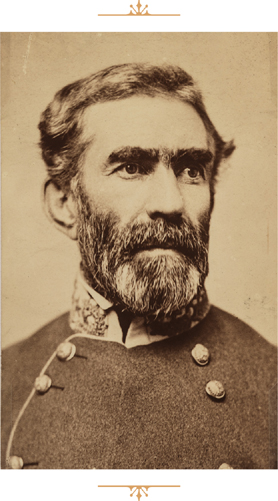 JGB
JGBIN MID-1863, ACTION UNFOLDED IN TENNESSEE THAT was overshadowed by the news from Vicksburg and Gettysburg but had as much intrigue and suspense as found in any military theater during the war. Among the leading players in that drama were Braxton Bragg (1817–1876), commander of the Army of Tennessee and one of the South’s most irascible and unlikable generals, and Pauline Cushman (opposite), a beguiling actress who infiltrated Bragg’s camp as a Union spy.
Bragg (inset) was disdained both by his officers and by his men because of his petulant disposition, stern discipline, and proclivity for attacking inopportunely and retreating ignominiously. Defeated at Perryville, Kentucky, in October 1862 after launching a hasty assault with only part of his army, Bragg withdrew to Tennessee, where Union general William Rosecrans repulsed his costly attack at Murfreesboro at year’s end in the Battle of Stones River. Bragg then fell back deeper into Tennessee and camped at Shelbyville. He retained command because President Jefferson Davis had admired him ever since they served together in the Mexican War. But he could ill afford to yield any more ground to Rosecrans, who was prodded into action by superiors in Washington, D.C., and descended on Bragg from the north in June 1863.
By her own account, Pauline Cushman’s covert role in that campaign began earlier that year when she was a struggling actress in Union-occupied Louisville, Kentucky. Two Confederate parolees offered her a bribe to toast Jefferson Davis during a performance. She consented but only after informing the Federal provost marshal, who encouraged her to pose publicly as a secessionist while serving secretly as a Union agent. After toasting Davis on stage, she was thrown out of the theater, thereby gaining the trust of Confederates. Pretending that she was seeking a missing brother who had enlisted to fight for the South, she became a camp follower of Bragg’s army. Her allure and beauty distracted Confederate officers, enabling her to observe their defenses around Shelbyville and make sketches that she concealed. Soon, however, she was caught in possession of incriminating papers. Bragg had her tried in military court, which sentenced her to hang but delayed the execution when she fell ill. In late June Bragg, outflanked by Rosecrans, hastily decamped, leaving the ailing Cushman behind. The oncoming Yankees rescued her and made her an honorary Union major. Rosecrans introduced her to the public later that year in Cincinnati, Ohio, as a scout, spy, and national heroine.
Braxton Bragg, meanwhile, once again had to retreat. But the forlorn general was handed an opportunity to redeem himself by Rosecrans, a man as moody and impulsive as he was. Overconfident after outmaneuvering Bragg and eager to counter criticism that he was too slow and indecisive, Rosecrans chased after the Army of Tennessee when it abandoned Chattanooga in early September and crossed into Georgia, where Bragg received reinforcements and lay in wait for his foe along a creek called Chickamauga.  JGB
JGB

THE GENERAL This portrait taken by photographer J. D. Edwards around 1861 shows Braxton Bragg as a brigadier general, the rank at which he entered Confederate service. Commenting on Bragg’s appearance, one soldier wrote: “The most remarkable feature is the eye, which is dark-gray and as strong and unflinching as a hawk’s.”
THE ACTRESS Pauline Cushman (1833–1893), born Harriet Wood in New Orleans, wears a Federal officer’s uniform with the insignia of major in a photograph attributed to Mathew Brady. She may have posed for Brady during her stint in 1864 with P. T. Barnum’s American Museum in New York City, where she regaled audiences with tales of her adventures as a spy. When she died destitute at the age of sixty, hundreds of Union veterans of the Grand Army of the Republic attended her funeral in San Francisco.